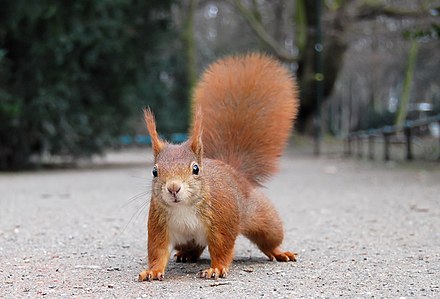Squirrels are a widely distributed rodent that belongs to the family Sciuridae and includes about 280 species distributed all over the world. Here are details about squirrels and their living habits:

Body shape: Medium in size, usually 15-20 cm in body length, 10-25 cm in tail, and slender.
Coat color: Coat colors are diverse, common ones include red, gray, brown and other different colors.
Tail: A squirrel's long, fluffy tail serves as a balance organ and for warmth when resting.
There are many species of squirrels that are widely distributed, including different species in North America, Eurasia, Africa, and South America.
Squirrels inhabit a variety of environments, such as forests, cities, grasslands, and mountainous areas. They build nests and nest piles, and also use tree cavities or buildings as habitat.
Omnivorous: Squirrels mainly feed on nuts, seeds, fruits, moss, insects and bird eggs. They have different main food sources in different seasons.
Activity: Squirrels are diurnal animals, usually more active in the early morning and evening.
Storage: During seasons of abundance, squirrels will accumulate food and store it underground for emergencies.
The mating season for squirrels varies depending on the species and is usually in the spring or summer.
Female squirrels become pregnant after the embedding period, which lasts approximately 3-6 weeks.
Natural predators of squirrels include birds of prey (such as hawks and harriers), cats, and many terrestrial predators such as foxes and martens.
Squirrels are generally very flexible and intelligent, able to find food and establish habitats in a variety of environments.
Squirrels have a positive impact on both forest and urban ecosystems, but in some cases are also considered pests in horticulture and agriculture, particularly on orchard crops.
Overall, squirrels are flexible, active and curious animals that display a range of unique living habits and adaptations in different environments, making them a striking part of nature.
animal tags: squirrel
We created this article in conjunction with AI technology, then made sure it was fact-checked and edited by a Animals Top editor.